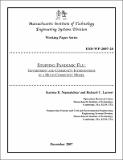| dc.contributor.author | Nigmatulina, Karima R. | |
| dc.contributor.author | Larson, Richard Charles | |
| dc.date.accessioned | 2016-06-03T13:08:08Z | |
| dc.date.available | 2016-06-03T13:08:08Z | |
| dc.date.issued | 2007-12 | |
| dc.identifier.uri | http://hdl.handle.net/1721.1/102904 | |
| dc.description.abstract | Focusing on mitigation strategies for global pandemic influenza, we use elementary mathematical models to evaluate the implementation and timing of intervention strategies such as travel restrictions, vaccination, social distancing and improved hygiene. A spreadsheet model of infection spread between several linked heterogeneous communities is based on analytical calculations and Monte Carlo simulations. Since human behavior will likely change during the course of a pandemic, thereby altering the dynamics of the disease, we incorporate a feedback parameter into our model to reflect altered behavior. Our results indicate that while a flu pandemic could be devastating; there are coping methods that when implemented quickly and correctly can significantly mitigate the severity of a global outbreak. | en_US |
| dc.language.iso | en_US | en_US |
| dc.publisher | Massachusetts Institute of Technology. Engineering Systems Division | en_US |
| dc.relation.ispartofseries | ESD Working Papers;ESD-WP-2007-28 | |
| dc.title | Stopping Pandemic Flu: Government and Community Interventions in a Multi-Community Model | en_US |
| dc.type | Working Paper | en_US |
